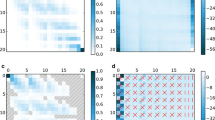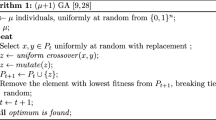Abstract
Modelling a finite population genetic algorithm (GA) as a Markov chain can quickly become unmanageable since the number of population states increases rapidly with the population size and search space size. One approach to resolving this issue is to “lump” similar states together, so that a tractable Markov chain can be produced. A paper by Spears and De Jong in [1] presents an algorithm that can be used to lump states together, thus compressing the probability transition matrix. However, to obtain a lumped model, one needs to calculate the exact transition matrix before the algorithm can be applied to it. In this paper, we explore the possibility of producing a reduced Markov model without the need to first produce the exact model. We illustrate this approach using the Vose model and Spears lumping algorithm on the Onemax problem with a selection-mutation GA.
Access this chapter
Tax calculation will be finalised at checkout
Purchases are for personal use only
Preview
Unable to display preview. Download preview PDF.
Similar content being viewed by others
References
Spears, W.M., De Jong, K.A.: Analyzing GAs using Markov Chains with Semantically Ordered and Lumped States. In: Proceedings of Foundations of Genetic Algorithms, Morgan Kaufmann Publishers, San Francisco (1996)
Davis, T.E., Principe, J.C.: A markov chain framework for the simple genetic algorithm. Evolutionary Computation 1, 269–288 (1993)
De Jong, K.A., Spears, W.M., Gordon, D.F.: Using Markov Chains to Analyze GAFOs. In: Whitley, L.D., Vose, M.D. (eds.) Proceedings of Foundations of Genetic Algorithms, vol. 3, pp. 115–137. Morgan Kaufmann, San Francisco (1995)
He, J., Yao, X.: From an Individual to a Population: An Analysis of the First Hitting Time of Population-Based Evolutionary Algorithm. IEEE Transactions on Evolutionary Computation 6, 495–511 (2003)
Nijssen, S., Bäck, T.: An Analysis of the Behaviour of Simplified Evolutionary Algorithms on Trap Functions. IEEE Transactions on Evolutionary Computation 7, 11–22 (2003)
Rees, J., Koehler, G.J.: An Investigation of GA Performance Results for Different Cardinality Alphabets. In: Davis, L.D., De Jong, K., Vose, M.D., Whitley, L.D. (eds.) Evolutionary Algorithms, pp. 191–206. Springer, New York (1999)
Wright, A.H., Zhao, Y.: Markov chain models of genetic algorithms. In: GECCO 1999 (Genetic and Evolutionary Computation Conference), vol. 1, pp. 734–741. Morgan Kaufmann Publishers, San Francisco (1999)
Spears, W.M.: A Compression Algorithm for Probability Transition Matrices. SIAM Journal on Matrix Analysis and Applications 20, 60–77 (1998)
Vose, M.D.: The Simple Genetic Algorithm: Foundations and Theory. The MIT Press, Cambridge (1999)
Nix, A.E., Vose, M.D.: Modelling genetic algorithms with Markov chains. Annals of Mathematics and Artificial Intelligence 5, 79–88 (1992)
Wright, S.: Evolution in Mandelian populations. Genetics 16, 97–159 (1931)
Fisher, R.A.: The genetical theory of natural selection. Clarendon Press, Oxford (1930)
Moey, C.C.J., Rowe, J.E.: Population Aggregation Based on Fitness. Natural Computing 3, 5–19 (2004)
Rowe, J.E.: Population fixed-points for functions of unitation. In: Reeves, C., Banzhaf, W. (eds.) Foundations of Genetic Algorithms, vol. 5, Morgan Kaufmann Publishers, San Francisco (1998)
Spears, W.M.: Aggregating Models of Evolutionary Algorithms. In: Angeline, P.J., Michalewicz, Z., Schoenauer, M., Yao, X., Zalzala, A. (eds.) Proceedings of the Congress on Evolutionary Computation, vol. 1, pp. 631–638. IEEE Press, Los Alamitos (1999)
Author information
Authors and Affiliations
Editor information
Editors and Affiliations
Rights and permissions
Copyright information
© 2004 Springer-Verlag Berlin Heidelberg
About this paper
Cite this paper
Moey, C.C.J., Rowe, J.E. (2004). A Reduced Markov Model of GAs Without the Exact Transition Matrix. In: Yao, X., et al. Parallel Problem Solving from Nature - PPSN VIII. PPSN 2004. Lecture Notes in Computer Science, vol 3242. Springer, Berlin, Heidelberg. https://doi.org/10.1007/978-3-540-30217-9_8
Download citation
DOI: https://doi.org/10.1007/978-3-540-30217-9_8
Publisher Name: Springer, Berlin, Heidelberg
Print ISBN: 978-3-540-23092-2
Online ISBN: 978-3-540-30217-9
eBook Packages: Springer Book Archive




